Untitled for Bijan & Manijeh
Iman Safaei
“Untitled for Bijan and Manijeh”
“As long as there is one prisoner in the world, there is no freedom.” —Jean-Paul Sartre
For me, the story of “Bijan and Manijeh” in Ferdowsi’s Shahnameh, is about the loneliness of contemporary man. With its long ceiling, Pasio’s space has become Bijan’s pit. It is the place in which Bijan (human) had spent his lonesome nights and days. With their architectural logic, the spindle-shaped structures are reminiscent of the Tower of Babel. The Tower of Babel is considered the origin myth of different languages: “Following the great flood, in the land of Shinar, they said to one another, ‘let us build us a city and a tower, whose top may reach unto heaven.’ The Lord confound their language, that they may not understand one another’s speech and scattered them abroad from there upon the face of all the earth.” Our tower, however, has its head in the ground: it is upside down. Where we think we have gained salvation, we fall—over and over again. Man is doomed to be lonely. Ours is a world of pain and injustice. We are the cause of these injustices, and it is us who acquiescence.
Iman Safaei


